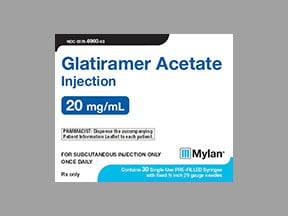
Copaxone Coupons & Savings Card – Discount Prices from $46.45
Brand for: Glatiramer
My prescription
Edit
1ML of 20MG/ML, Glatiramer (1 Syringe)
Select pharmacy

CVS
$203.89
COUPON PRICE
Albertsons
$46.45
COUPON PRICE
Walgreens
$49.02
COUPON PRICE
Walmart
$198.27
COUPON PRICECopaxone savings card
Show this card to your pharmacist
Albertsons
$46.45
BIN
ID
PCN
GRP
019876
LHEB2B2317
CHIPPO
LHX
Powered by
Related interferon betas prescriptions
More prescriptions for multiple sclerosis
Related interferon betas prescriptions
More prescriptions for multiple sclerosis
Price history for Copaxone (brand) & Glatiramer (generic)
1 Syringe, 1ML of 20MG/ML
Average retail price for Copaxone
Average retail price for Glatiramer
Average SaveHealth price for Glatiramer
Our price history data is based on aggregated prescription data collected from participating pharmacies in America. Our prescription data updates daily to reflect the latest price changes. If you notice a missing data point, it means there wasn't sufficient data available to generate a monetary value for that date.
Over the last 12 months, the average discount price of Copaxone is $95.22 using the SaveHealth savings card. That's an average savings of 68.43% on Copaxone with our discount card.
*Retail prices are based on pharmacy claims data, and may not be accurate when we don't have enough claims.
Copaxone (Glatiramer) dosage forms
Dosage Quantity Price from Per unit 1ML of 20MG/ML 1 Syringe $46.45 $46.45 1ML of 20MG/ML 2 Syringes $85.41 $42.70 1ML of 20MG/ML 3 Syringes $124.36 $41.45 1ML of 40MG/ML 1 Syringe $101.87 $101.87 1ML of 40MG/ML 2 Syringes $196.25 $98.13 1ML of 40MG/ML 3 Syringes $290.62 $96.87
| Dosage | Quantity | Price from | Per unit |
|---|---|---|---|
| 1ML of 20MG/ML | 1 Syringe | $46.45 | $46.45 |
| 1ML of 20MG/ML | 2 Syringes | $85.41 | $42.70 |
| 1ML of 20MG/ML | 3 Syringes | $124.36 | $41.45 |
| 1ML of 40MG/ML | 1 Syringe | $101.87 | $101.87 |
| 1ML of 40MG/ML | 2 Syringes | $196.25 | $98.13 |
| 1ML of 40MG/ML | 3 Syringes | $290.62 | $96.87 |
What is copaxone used to treat?
Copaxone is used to treat multiple sclerosis (MS). It helps reduce the frequency of relapses in patients with relapsing forms of MS.
Is copaxone a good MS drug?
Copaxone (glatiramer acetate) is a medication commonly used to treat relapsing forms of multiple sclerosis (MS). It is considered effective in reducing the frequency of relapses and slowing the progression of physical disability in some patients. However, the effectiveness and suitability of Copaxone can vary depending on the individual's specific condition and response to the medication. It is important for patients to discuss with their healthcare provider to determine if Copaxone is the right treatment option for their MS.
Does Copaxone make you lose weight?
Weight loss is not a common side effect of Copaxone (glatiramer acetate). If a patient experiences significant weight changes while taking Copaxone, it is advisable to consult with a healthcare provider to determine the cause and address any concerns.
Is Copaxone an immunosuppressant drug?
Copaxone is not classified as an immunosuppressant. It is an immunomodulator used primarily in the treatment of multiple sclerosis to help reduce the frequency of relapses.
Does copaxone cause weight gain?
Weight gain is not commonly reported as a side effect of Copaxone (glatiramer acetate). However, individuals may experience different side effects, and any unexpected changes in weight should be discussed with a healthcare provider to rule out other causes or address any concerns.
